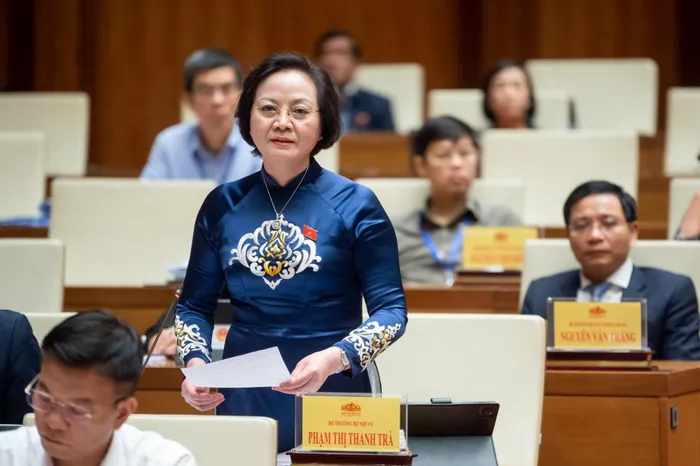
Salary reform is one of the issues that many National Assembly deputies are interested in questioning Minister of Home Affairs Pham Thi Thanh Tra. Photo: National Assembly
Spending on salary reform is 470 trillion VND, pension adjustment is 11.1 trillion VND
The National Assembly voted to pass the Resolution on the 2024 state budget estimate, including the content on implementing salary policy from July 1, 2024.
It is expected that the total central budget for salary reform will be about 132 trillion VND; the accumulated source of local budgets will be about over 430 trillion VND.
Thus, the budget has allocated 562 trillion VND to ensure sufficient implementation of synchronous salary policy reform from July 1, 2024 according to Resolution 27/2018 of the 12th Central Committee on salary policy reform for cadres, civil servants, public employees, armed forces and employees in enterprises.
According to the Government 's calculations, to implement salary reform, the total expected additional budget demand from the budget in the 2024 - 2026 period is more than 499 trillion VND. Of which, the expenditure for salary reform is 470 trillion VND, pension adjustment is 11.1 trillion VND and preferential allowance for meritorious people is 18 trillion VND.
Average salary of civil servants and public employees increased by about 30%
The notable point of the new wage policy is that the lowest wage in the public sector is equal to the average lowest wage in the business sector.
Currently, the salary in the business sector is divided into 4 regions: Region 1 is 4.68 million VND/month; Region 2 is 4.16 million VND/month; Region 3 is 3.64 million VND/month and Region 4 is 3.25 million VND/month. Thus, the average lowest salary in the business sector is currently more than 3.9 million VND.
It is expected that by the end of this year, the Ministry of Labor, War Invalids and Social Affairs will submit to the Government a plan to increase the regional minimum wage. In recent discussions at the National Assembly, many delegates proposed increasing the regional minimum wage at the same time as the roadmap for implementing wage reform from July 1, 2024.
"Through four salary reforms, I have never seen a salary policy as synchronous, comprehensive, and fundamental as this one. This is a new salary policy that is very progressive, fair, truly harmonious, and reasonable," said Minister of Home Affairs Pham Thi Thanh Tra.
Therefore, if the regional minimum wage increases, the average lowest salary in the business sector will also increase higher than the current level of 3.9 million VND.
In addition, the new wage policy also expands the wage relationship from the current 1 - 2.34 - 10 to 1 - 2.68 - 12.
Accordingly, the lowest salary of civil servants and public employees will increase quite a bit compared to the current starting salary of 3.5 million VND for civil servants and public employees with intermediate qualifications, with a salary coefficient of 1.86.
The average starting salary of civil servants and public employees also increased from a coefficient of 2.34 to 2.68. Currently, civil servants and public employees with university degrees have a starting salary of more than 4.2 million VND/month.
The highest salary of civil servants and public employees corresponding to level 3 of senior experts (equal to the salary of a minister) has also been expanded from a coefficient of 10 to 12. Therefore, the new highest salary of civil servants and public employees is expected to far exceed the current figure of 18 million VND.
In addition to this basic salary, the new salary regime also rearranges allowances accounting for a maximum of 30% of the total salary fund (in some cases higher than 30% or lower than 30%) and 10% bonus.
Thus, if including basic salary, allowances and bonuses, the average salary of civil servants and public employees after implementing salary reform increased by more than 32% compared to the average income of salaried workers (7.5 million VND/month).
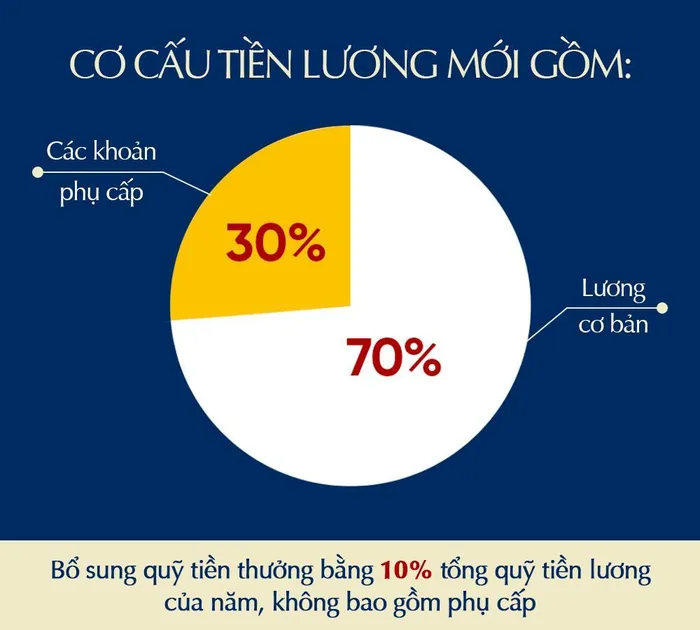
New salary structure.
Continue to increase salaries by 7%/year from 2025
Another notable point is that from 2025, the Government will continue to adjust the salary levels in the salary tables to increase by an average of about 7%/year. That is, after implementing the salary reform, there will be a new salary table with higher salaries than the current one, and civil servants and public employees will still receive a 7% salary increase every year.
The wage increase is 7% to compensate for inflation and is somewhat improved according to GDP growth and is implemented until the lowest wage of the fair sector is equal to or higher than the lowest wage of zone 1 of the enterprise sector.
Minister of Home Affairs Pham Thi Thanh Tra emphasized that the National Assembly's approval of the salary reform policy this time is both historic and topical, creating a joyful and exciting mood in society and among cadres, civil servants and public employees.
To implement the wage reform policy is the outstanding effort of all levels and sectors in the past time. Among them, we must mention the effort in creating resources for wage reform.
However, to have a source to implement a sustainable wage reform policy and ensure annual growth rate, according to the Minister of Home Affairs in the coming time, the top priority is to focus on creating sustainable financial resources.
Therefore, how to collect the budget and save on spending to ensure a source for salaries after the 2024 - 2026 period is an issue that needs attention.
9 types of allowances under the new salary regime include:
Concurrent-duty allowance; seniority allowance exceeding the framework; regional allowance; job responsibility allowance; mobility allowance; preferential allowance according to profession; allowance for working in areas with especially difficult socio-economic conditions; allowance according to administrative unit classification and according to public service unit classification; allowances applied specifically to the armed forces.
Medical and education salaries will be higher than the average.
Minister of Home Affairs Pham Thi Thanh Tra said that a notable point when implementing salary reform is that the salary of civil servants, especially education and health officials, will be higher than the average salary of other civil servants and public employees.
Because we are reforming the salary policy in conjunction with implementing the resolution on fundamental and comprehensive development of education, training, and healthcare. Especially through the recent COVID-19 pandemic, it shows that we need to pay more attention to improving the lives of teachers and medical staff.
Therefore, when reforming salaries, the Ministry of Home Affairs will coordinate with the Ministry of Education and Training and the Ministry of Health to request competent authorities to pay attention to adjusting support to ensure that salaries (including allowances) of teachers and doctors are increased in accordance with their requirements and job positions, both ensuring the general salary level of cadres, civil servants and public employees, and showing preferential treatment for these two sectors.
It is expected that the average salary of cadres, civil servants and public employees will increase by about 30%.
Minister of Home Affairs Pham Thi Thanh Tra said that according to the salary reform plan, from July 1, the average salary of cadres, civil servants and public employees is expected to increase by about 30% (including basic salary and allowances).
From 2025, this salary will continue to be adjusted to increase by an average of about 7% per year.
Although we have not implemented salary reform in the past 3 years, we have adjusted the basic salary twice, increasing it by 29.5%. Thus, calculating the total from 2021 (the expected time to implement salary reform in the spirit of Resolution No. 27-NQ/TW) to July 1, the average salary of officials, civil servants and public employees has also increased quite a lot, about 60%.
According to Minister Pham Thi Thanh Tra: "This figure is not outstanding, but it is a significant increase compared to the average annual increase of 7% before salary reform was implemented."
This demonstrates the great efforts of the Government, as well as the Ministry of Home Affairs and other ministries and branches in implementing salary policy reform according to Resolution 27 of the 12th Central Committee; especially in the context of limited budget and economic difficulties after the impact of the COVID-19 pandemic.
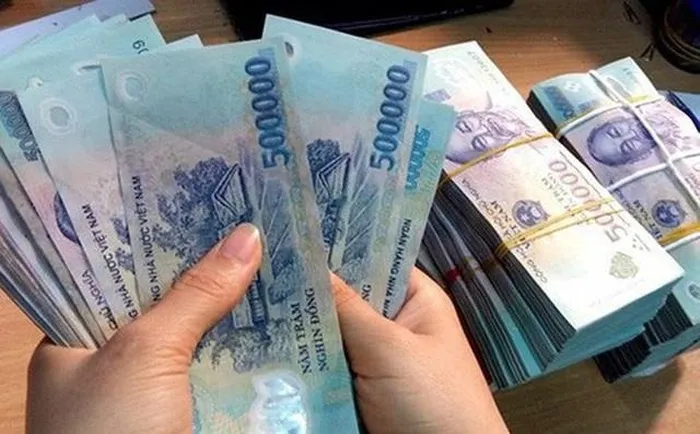
Consider reserving salary and income in specific units
Providing more information on salaries for officials, civil servants, and public employees at special units, Minister Pham Thi Thanh Tra said that according to Resolution 27, we will soon abolish mechanisms and policies on special salaries and incomes.
Currently, there are 134,284 cadres and civil servants in state administrative agencies and units applying special financial and income mechanisms (with additional salaries in addition to the general regime from 0.66 times to 2.43 times). This number accounts for about 6.78% of the total payroll of cadres, civil servants and public employees nationwide.
When abolishing the mechanisms and policies on salary and special income, they will receive new salaries (including allowances) that may be lower than before the salary reform. Therefore, to ensure their regime, the Ministry of Home Affairs calculates to advise competent authorities to consider reserving the current salary and special income.
That is, the new salaries (including retained salaries) of these cadres, civil servants and public employees are not lower than before salary reform was implemented in accordance with the spirit of Resolution No. 27, ensuring fairness between salary recipients before and after salary reform.
Minister Pham Thi Thanh Tra hopes that cadres, civil servants and public employees at specific units will share the Party's general policy to effectively implement salary reform.
Source: Chinhphu.vn
Source



![[Photo] Cutting hills to make way for people to travel on route 14E that suffered landslides](https://vphoto.vietnam.vn/thumb/1200x675/vietnam/resource/IMAGE/2025/11/08/1762599969318_ndo_br_thiet-ke-chua-co-ten-2025-11-08t154639923-png.webp)









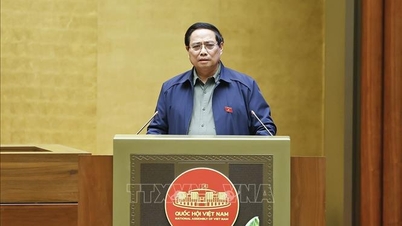

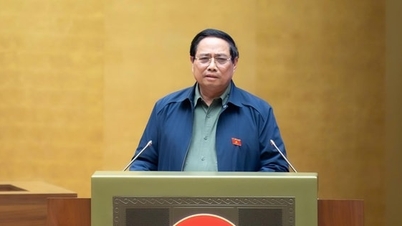

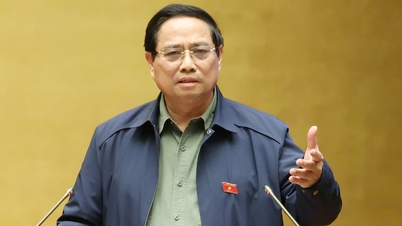
























![[Video] Hue Monuments reopen to welcome visitors](https://vphoto.vietnam.vn/thumb/402x226/vietnam/resource/IMAGE/2025/11/05/1762301089171_dung01-05-43-09still013-jpg.webp)



































































Comment (0)